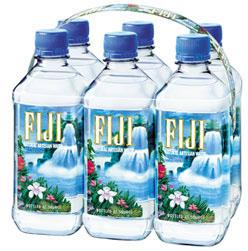|
|
Fiji Water Foists "Eco Friendly" Campaign On Gullible Consumers
Posted by Pile
(22691 views) |
[Liars] |
 Suppose, for example, that you own a company that sells bottled water," which is "shipped, in its little plastic bottles, ten thousand miles from the bottling plant to the consumer," writes Steve Burns. "Could you possibly 'brand' such a product as eco-friendly?" Suppose, for example, that you own a company that sells bottled water," which is "shipped, in its little plastic bottles, ten thousand miles from the bottling plant to the consumer," writes Steve Burns. "Could you possibly 'brand' such a product as eco-friendly?" | |
If you answered "no" to that question, then you don't know our modern PR industry. Because Fiji Water, a company that ships its bottled water all the way from, yes, Fiji, is now claiming the "green" label, in an ad campaign called "Every drop is green" (not a very appetizing image for bottled water, I admit, but in the PR industry you work with what you've got.) Here's how it's done: First, buy some carbon credits. In fact, you'd better buy a lot of carbon credits (remember those diesel-powered ships, full of little plastic bottles of water, wending their way from Fiji, through the Panama Canal, to New York.) Heck, while you're at it, buy enough carbon credits so that you can claim your product is not just carbon-neutral, but carbon-negative. Then you can claim that people who buy your bottled water are actually helping the environment with every sip. You can even claim that drinking a 1.5 Liter bottle of water does as much good for the planet as "walking five blocks to the grocery store instead of driving." (Yes, they really did say that.) Then, you'll need a scientific study to throw some doubt on the concept of "food miles" and the environmental impact of shipping food and water halfway around the world. How about a study co-written by a representative for lamb producers in New Zealand? (Some day, the New Zealand Lamb producers and the Fiji Water people should get together in an who-has-the-most-chutzpah contest). Next, take your New Zealand lamb producers study and build a story around it at your "Fiji Green Blog", under the title: "Debunking the 'food miles' myth." Some pitfalls to watch out for: Blogs, like your "Fiji Green Blog" generally allow for comments, and the comments you attract might not be favorable. Expect comments like these: "Because of your red-herring approach I think Iím going to have to give up drinking Fiji water - I just canít support a company that lies." "[N]o matter how much you try to green-wash your product, itíll never be environmentally friendly, sustainable, or just." "How you define or even mitigate your inevitable food miles makes no difference really- drinking something that exists locally already, with an infrastructure/process in place already- will ALWAYS be less wasteful than importing something you already have." "Thereís so much wrong with this site I donít even know where to start. First of all, the article presents a strawman argument that shipping water around the world is somehow comparable to shipping food products from Kenya. Also, the effectiveness of carbon offsets are highly controversial, and should never be used as a substitute for direct carbon emissions when possible." Ouch! Better hire a good PR person to respond to those comments ("Ecodaddy, thanks for your feedback..."). Above all, emphasize that the issue is complicated, with arguments like this: "[B]ottling from a local spring doesnít necessarily require the same energy as bottling abroad. It could be more or less. There are many factors that make a difference, whether itís packaging choice, emissions intensity in the local grid, the amount of processing involved, and more." "Pay no attention to those ships full of water!" Some apples-to-oranges comparisons might be helpful, too. For example, did you know that it takes much more energy to make a glass bottle than a plastic bottle? So, by packaging its water in plastic bottles, Fiji Water is helping to reduce carbon emissions! | |
Details | |
| 1 Article displayed. |


 Bumper Sticker Store
Bumper Sticker Store



